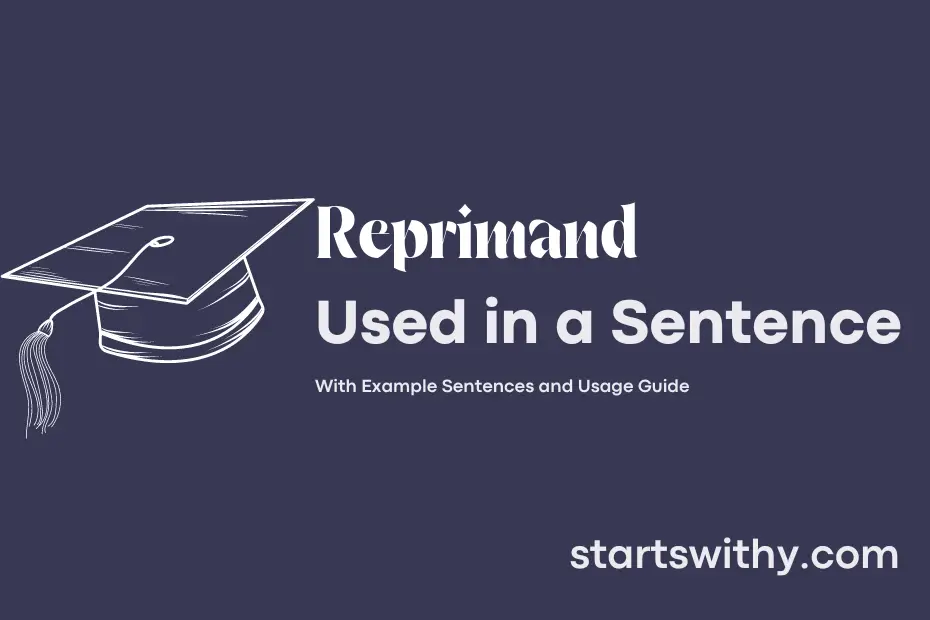Have you ever found yourself receiving a reprimand at work or school and wondered what it truly meant? Essentially, a reprimand is a formal scolding or rebuke given to someone who has done something wrong or unacceptable. It is a disciplinary measure aimed at correcting behavior or actions that are not in line with established rules or norms.
Reprimands can range from mild warnings to more severe reprimands depending on the severity of the infraction. It is crucial to understand the context and reasons behind a reprimand to learn from the mistake and avoid repeat occurrences. Remember, a reprimand is meant to guide and correct behavior, not to shame or degrade an individual.
7 Examples Of Reprimand Used In a Sentence For Kids
- Teacher gave a reprimand when the student was talking in class.
- It is not nice to run in the classroom, you might get a reprimand.
- Always listen to your elders to avoid getting a reprimand.
- Remember to raise your hand before speaking to avoid a reprimand.
- Do not forget to say sorry if you receive a reprimand.
- Always follow the rules to prevent a reprimand.
- It is important to behave well in school to avoid a reprimand.
14 Sentences with Reprimand Examples
- Reprimand your friend for copying your assignment without permission.
- The professor will reprimand the student for being late to class.
- It is important for parents to reprimand their children for neglecting their studies.
- Your advisor may reprimand you for not following the academic guidelines.
- The librarian will reprimand students for being too noisy in the library.
- Reprimand your group members for not contributing equally to the project.
- The dean will reprimand students who are involved in any form of plagiarism.
- It is necessary for teachers to reprimand students who disrupt the class.
- The college administration may reprimand students for violating the dress code.
- Your coach will reprimand you for not attending practice sessions regularly.
- The disciplinary committee will reprimand students for engaging in any form of misconduct.
- It is essential for seniors to reprimand juniors who are not showing respect towards faculty members.
- The college authorities have the right to reprimand students for breaking any rules or regulations.
- Your peers may reprimand you for not taking your studies seriously and prioritizing social activities.
How To Use Reprimand in Sentences?
To use the word “reprimand” effectively in a sentence, follow these steps:
-
Understand the meaning: Before using “reprimand,” make sure you understand that it means to express disapproval or criticism, scold, or rebuke someone for their actions.
-
Choose the right context: Make sure the situation warrants a reprimand. It is usually used in formal or disciplinary settings to address someone’s behavior or actions.
-
Structure your sentence properly: Begin your sentence with the subject (the person being reprimanded) followed by the action that led to the reprimand. Then, use “reprimand” followed by who is reprimanding whom. For example, “The teacher reprimanded the student for talking during class.”
-
Be concise and clear: Keep your sentence clear and to the point. Avoid using unnecessary words that may confuse the reader.
-
Consider the tone: Depending on the severity of the situation, the tone of the sentence may vary. Use a serious tone for formal reprimands, and a lighter tone for playful or friendly reprimands.
-
Practice: To become more comfortable using “reprimand” in a sentence, practice constructing sentences in different contexts or scenarios. This will help you become more confident using the word in your writing or conversations.
By following these simple steps, you can effectively incorporate the word “reprimand” into your vocabulary and communication skills.
Conclusion
In conclusion, reprimand is a form of scolding or rebuking someone for their actions. It is often used to correct behavior or enforce discipline. For example, a teacher may reprimand a student for talking out of turn in class or a parent may reprimand a child for not following instructions. Employers may also issue a reprimand to employees for violating company policies or procedures.
It is essential to understand the impact of reprimanding others and to use this form of correction judiciously and constructively. While reprimands are necessary for maintaining order and instilling discipline, it is crucial to strike a balance between correction and encouragement to foster positive growth and development in individuals. Effective reprimands should be clear, specific, and aimed at correcting behavior rather than causing humiliation or resentment.



